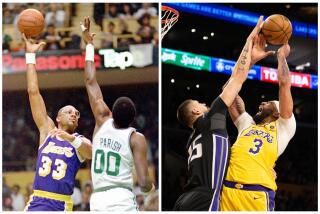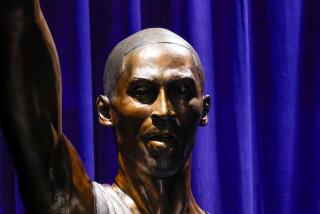Bryant pays price for NBA’s over-vigilance
This could happen only to Kobe Bryant, the league’s scourge and darling, all at once.
This could happen only in the NBA, the League of Extraordinary Unintended Consequences.
Appearances notwithstanding, the NBA is not conducting a witch hunt aimed at Bryant. A witch hunt would, at least, suggest some design.
Of course, you may be wondering just what the league is doing?
“The priority is to keep players safe from injury and not cause further incident,” said NBA Vice President Stu Jackson from New York.
“The fact that we identify and then subsequently investigate and ultimately in cases where it warrants a penalty, we issue them, that speaks to our openness and our integrity....
“It’s not something we want to hide under a rock. These incidents are not subject to looking at the court of public opinion meter.”
Not that another official explanation was likely to clear up all questions, like ... huh?
In the post-Auburn Hills era with Commissioner David Stern determined to eliminate fighting, a formal review now takes up anything that looks bad, often penalizing players after the fact for offenses no one remembered.
Bryant, the only player with multiple suspensions this season, just became the poster boy for what could go wrong.
Videotape isn’t being there. There’s a reason the NBA uses instant replay on last-second shots ... and nothing else.
Whether Bryant committed any offense is arguable ... and he never got to present an argument.
Nor were there any complaints. Like the Spurs’ Manu Ginobili and the Timberwolves’ Marko Jaric, the 76ers’ Kyle Korver didn’t think Bryant elbowed him intentionally.
“After I saw it on replay, it looked a lot worse than I thought it was during the game,” Korver told the Philadelphia Daily News. “It all happens fast. It’s no big deal.”
Nevertheless, four days later, Jackson assessed Bryant with a flagrant foul. The result was predictable: Headlines, replays, angry Lakers (although not everyone has a coach who’ll call it a “witch hunt”), ESPN Radio’s Dan Patrick debating whether Bryant was a dirty player.
Suggesting the dysfunction in the process, Bryant isn’t a dirty player ... and the league isn’t out to get him.
A two-day period, Jan. 30 and 31, illustrates the whole tangled story.
On Jan. 30 with the Lakers in New York, Bryant was informed of his first suspension. Stunned, he sat out the game as Knicks fans booed the announcement. The next day, the NBA announced that he’d be one of the judges for the All-Star dunk contest with icons such as Michael Jordan and Julius Erving.
League officials may not have realized the irony, but Bryant did, noting, “The league didn’t tell me that when they suspended me.”
Tempted as he looked to tell them what they could do with their contest, he participated, saying later he never dreamed he’d ever find himself “chopping it up with Dr. J and Mike.”
Bryant was all over Las Vegas. The league even asked him to speak at a breakfast honoring ABA players, although he wasn’t even born in 1976 when the ABA folded.
Appropriately enough, Bryant won the All-Star MVP award in what was seen as the symbol of his return.
Two weeks later, Jackson noticed his arm in a familiar “unnatural” basketball action, connecting with Jaric’s head, and suspended him again. League officials were privately aghast that after being penalized once, Bryant would do something similar again.
Jackson says freely that determining intent is beyond what he can do. His standard is simple: Blows to the head with an elbow are unacceptable.
If Bryant was a local darling, he wasn’t as popular around the league or with opposing players. He was called a lot of things; his own Nike ad a year ago listed “selfish ... uncoachable ... outcast
However, in a long career of upsetting people, no one ever said he was a dirty player.
It was Bryant’s will that separated him from the crowd. The more defeat loomed, the more desperate he was. Coincidentally or not, all three offenses came late in losses.
League officials insist they had to treat him the same way they treated Zaza Pachulia and the punishment (flagrant foul) fit the crime (elbow to Korver’s head.)
Personally, I’d start wondering about my assumptions.
How close could it have come to starting a fight if the other player didn’t act upset? After the fact, after three of your officials have made their call, in the absence of complaints, doesn’t common sense suggest a higher burden of video proof?
Are we paying a high price in public opinion, certifying heretofore unknown acts as violent ... trying to stamp out violence so it won’t lower public opinion?
Otherwise, if things get much tougher, the league may have to tackle thought crime next.
More to Read
All things Lakers, all the time.
Get all the Lakers news you need in Dan Woike's weekly newsletter.
You may occasionally receive promotional content from the Los Angeles Times.







